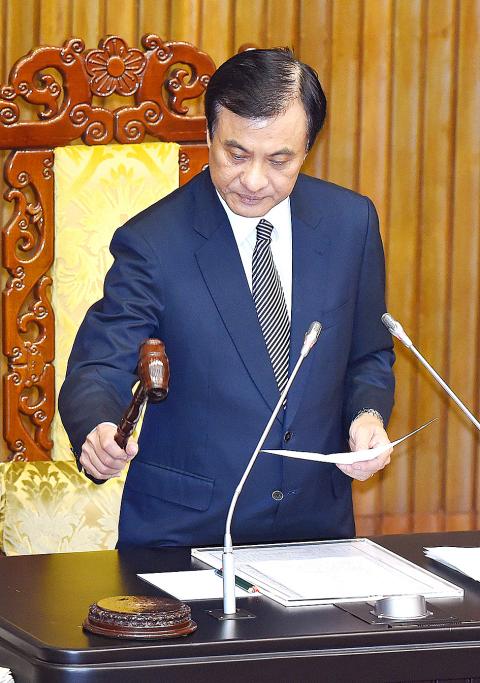Amendments to the HIV Infection Control and Patient Rights Protection Act (人類免疫缺乏病毒傳染防治及感染者權益保障條例) that allow organ transplants between HIV-positive people cleared the legislative floor yesterday.
The amendments would allow HIV-positive people to donate organs, bodily fluids, tissue or cells to other HIV carriers as long as the recipients sign an agreement to undergo the transplant.
The organs, bodily fluids, tissue and cells of people with HIV are otherwise unusable, and those who offer to donate such body parts to HIV-negative people would risk a fine of between NT$30,000 and NT$150,000, one amendment says.

Photo: Liao Chen-huei, Taipei Times
The amendments were proposed while taking into consideration the need for organ transplants by HIV-positive people and after referencing the US’ HIV Organ Policy Equity Act and successful organ transplants in the UK between HIV-positive people, the Executive Yuan said, explaining its version of the legislation.
As of Sept. 30 last year, there were 33,850 HIV-positive people in Taiwan, all of whom could be potential donors or recipients for organ transplants, said Chinese Nationalist Party (KMT) Legislator Arthur Chen (陳宜民), who helped push for the legislation.
Apart from the US and the UK, Spain has also allowed organ transplants between HIV-positive people, he said.
Japan, despite not having legalized organ transplants between HIV carriers, has had six successful such operations, which had no discernible difference in the survival rate of recipients compared with HIV-negative people, he added.
One of the amendments, initiated by Democratic Progressive Party Legislator Lin Ching-yi (林靜儀), says that although people with HIV are legally required to inform paramedics when seeking medical help that they are HIV-positive or risk a penalty, those who are unconscious, in a state of decreased consciousness or whose privacy would be infringed upon as a result of disclosing such information would be exempted from the regulation.

MORE VISITORS: The Tourism Administration said that it is seeing positive prospects in its efforts to expand the tourism market in North America and Europe Taiwan has been ranked as the cheapest place in the world to travel to this year, based on a list recommended by NerdWallet. The San Francisco-based personal finance company said that Taiwan topped the list of 16 nations it chose for budget travelers because US tourists do not need visas and travelers can easily have a good meal for less than US$10. A bus ride in Taipei costs just under US$0.50, while subway rides start at US$0.60, the firm said, adding that public transportation in Taiwan is easy to navigate. The firm also called Taiwan a “food lover’s paradise,” citing inexpensive breakfast stalls

US PUBLICATION: The results indicated a change in attitude after a 2023 survey showed 55 percent supported full-scale war to achieve unification, the report said More than half of Chinese were against the use of force to unify with Taiwan under any circumstances, a survey conducted by the Atlanta, Georgia-based Carter Center and Emory University found. The survey results, which were released on Wednesday in a report titled “Sovereignty, Security, & US-China Relations: Chinese Public Opinion,” showed that 55.1 percent of respondents agreed or somewhat agreed that “the Taiwan problem should not be resolved using force under any circumstances,” while 24.5 percent “strongly” or “somewhat” disagreed with the statement. The results indicated a change in attitude after a survey published in “Assessing Public Support for (Non)Peaceful Unification

PLUGGING HOLES: The amendments would bring the legislation in line with systems found in other countries such as Japan and the US, Legislator Chen Kuan-ting said Democratic Progressive Party (DPP) Legislator Chen Kuan-ting (陳冠廷) has proposed amending national security legislation amid a spate of espionage cases. Potential gaps in security vetting procedures for personnel with access to sensitive information prompted him to propose the amendments, which would introduce changes to Article 14 of the Classified National Security Information Protection Act (國家機密保護法), Chen said yesterday. The proposal, which aims to enhance interagency vetting procedures and reduce the risk of classified information leaks, would establish a comprehensive security clearance system in Taiwan, he said. The amendment would require character and loyalty checks for civil servants and intelligence personnel prior to

The China Coast Guard has seized control of a disputed reef near a major Philippine military outpost in the South China Sea, Beijing’s state media said, adding to longstanding territorial tensions with Manila. Beijing claims sovereignty over almost all of the South China Sea and has waved away competing assertions from other countries as well as an international ruling that its position has no legal basis. China and the Philippines have engaged in months of confrontations in the contested waters, and Manila is taking part in sweeping joint military drills with the US which Beijing has slammed as destabilizing. The Chinese coast guard